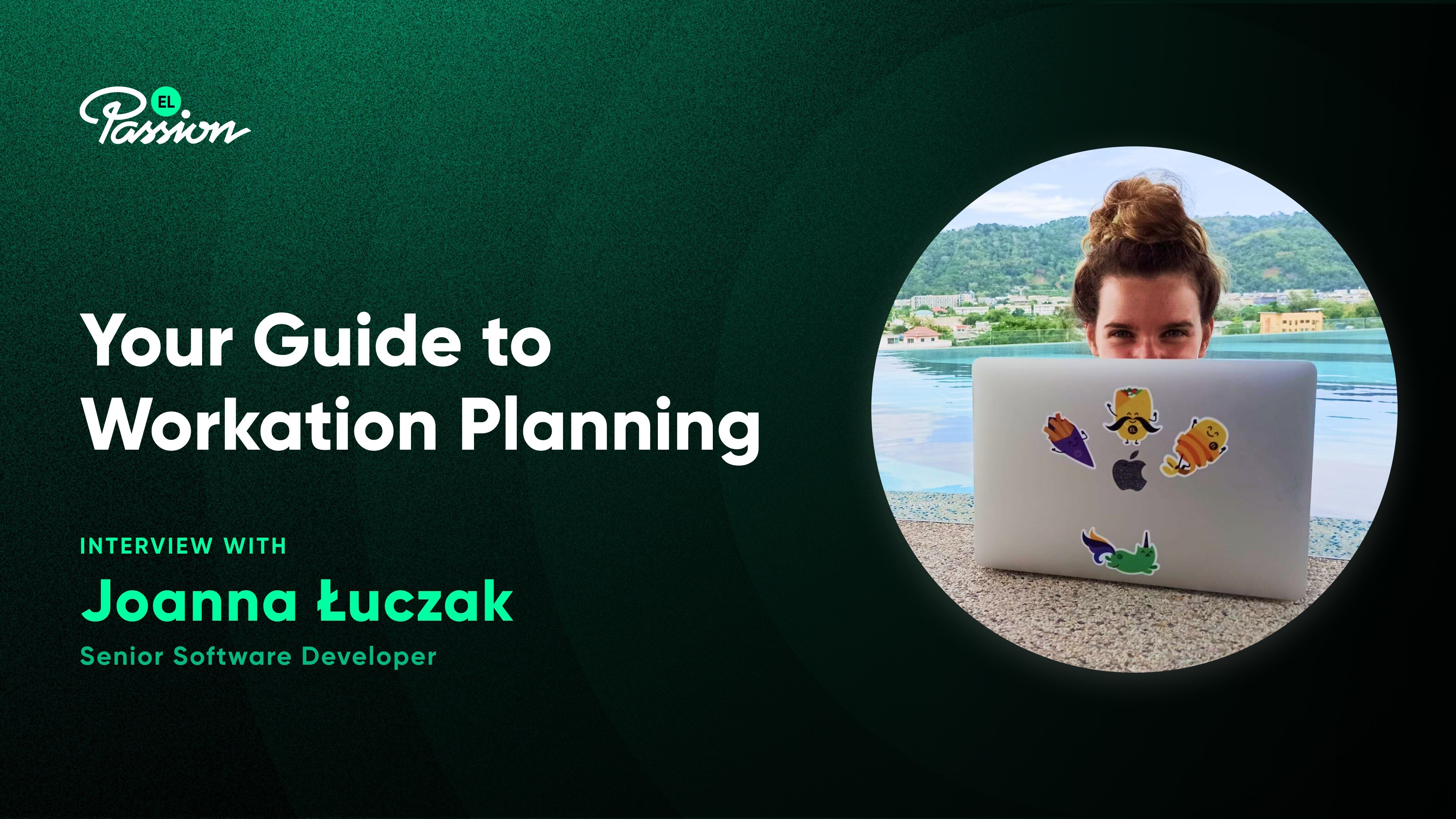24 August 2022 (updated: 21 September 2022)
Your Guide to Workation Planning — Interview with Joanna Łuczak, Senior Software Developer
Chapters

Joanna Łuczak, our Senior Software Developer, spent a total of several months working from various locations around the world. In the interview, she gives tips on workationing, talks about the advantages of this mode of work and shares her advice that beginners might find useful.
The pandemic ultimately changed how we view office work. It made employers realize that much of it can be done from anywhere in the world and that there’s no need to tie employees to their desks. A new formula of workation has emerged, the idea of which is basically what the word literally means - a combination of work and vacation.
Sounds great, but what exactly does this new way of working mean? What are the pros and cons of working from the other side of the world, how to choose the right place for you, and what to look out for?
Joanna Łuczak, our Senior Software Developer, has been regularly testing and taking advantage of remote work opportunities in various locations around the world since the beginning of the pandemic. Asia shared with us her experience gained through remote work combined with active leisure.
Interview with Joanna Łuczak — Workation planning
Natalia Paczuska: When did you start going on workation? Where have you had the opportunity to work so far?
Joanna Łuczak: My adventure with workation began in the pandemic, when I got stuck in Vietnam (fortunately with a laptop) in lockdown and had to work remotely from the other side of the world. Although it was quite accidental, it sparked my interest in traveling and working all over the world. So far, in addition to Vietnam, I have had the opportunity to work from Spain, the Canary Islands, Thailand and Bali.
Over these two years you have indeed tested quite a few places. What influenced your choice of them?
I mainly considered places that would not strain my budget. I was aware that if I wanted to stay somewhere for 3 months, I would have to rent accommodations or apartments that met certain conditions. Hence, my choices fell mainly on Asia. When choosing my place to stay, I also betted on ones that have some kind of infrastructure. The main determinant was good Internet connection and the ability to communicate in English. Well, and the 3rd point was that it should be warm to escape the sometimes freezing Eastern European climate.
How did you organize your daily work? How did you deal with the time difference?
When I was working in Spain and the Canary Islands, there was virtually no difference, because the timezones are similar. My work life looked pretty much the same, except that after work I would go sightseeing or indulge in other activities, such as surfing.
 Source: Joanna's private album
Source: Joanna's private album
But it wasn't much of a problem in Asia either. Here, however, a bit more self-discipline was needed, but I also chose places that made it easier for me. For example, in Thailand I found an accommodation that had a co-working space and organized activities. This helped a lot in planning my day. In the morning, there was motivation to get up for classes and practice yoga, for example, and in the afternoon to sit at the computer and work in the Polish time zone.
The important thing is to set times for work and rest and really stick to it.
I also let my team and clients know in advance where I am, so they know that if it's 4pm at their place, it's 10pm at my place, so no one throws in meetings outside my working hours. But those specific working hours were also my choice. If I had preferred to start work later to take advantage of the attractions the place offers, I'm sure there would have been no problem with that either.
What are some benefits of this type of work that you see, what can you gain?
What I think is a big advantage is better or to say it bluntly “real” work-life balance. When I work from home, it's very easy to stay overtime, because I may seem to finish at 5pm, but there's always something extra to do or talk about. When I'm on workation I either have some after-work plans, or it's after 10 pm and I’ve got no strength left to continue working. Plus workationing gives you a chance to change your environment and a give you a break from everyday life. It’s a moment to see new places, cultures, and in addition to work, to just relax.
Did you notice any difficulties or challenges that surprised you?
When you’re in a new environment that you’re just getting to know it’s actually for the best to prepare for some surprises. Well, if you don’t plan it well, you may have trouble finding cool accommodation that suits you 100 percent. Even more so if you are going to a touristy place and in high season. However, if you prepare well and do your research, you’re all good. What I would pay attention to when choosing a place is good internet, a comfortable place to work and air conditioning if you are flying to a tropical country.
.jpg?width=5568&name=Image%20from%20iOS%20(49).jpg) Source: Joanna's private album
Source: Joanna's private album
Any advice for people who are considering going on workation? What in particular is worth paying attention to?
First of all, remember such basics as taking a Revolut-type card with you and taking out good insurance.
When it comes to work, I would also advise you to make sure you have a good Internet connection beforehand and buy the appropriate data package necessary for work, just in case. Just to be safe, you can ask your hotel or landlord to do a speed test and send you a picture for review. It's also a good idea to look for places with coworking spaces or internet cafes nearby.
If you're planning to travel to a different time zone, it's a good idea to find places where there's something nearby that motivates you to get out of bed, such as some activities or the beach. So that you can separate your work time from your leisure time.
You can find many useful tools on the Internet to help you choose the right place to work remotely. I personally use Nomad List, where you can find practically every major city in the world and check it from different angles: internet, fun, cost of living, safety, etc. You can also find a lot of information on Facebook. There are many groups dedicated to workationing there.
What other places are you planning to visit?
Soon we are preparing a joint workation trip with our entire EL Passion team. We will have the opportunity to spend time after work and integrate. This is our first trip like that and I'm already looking forward to it. Apart from that I have plans to work from Japan, Singapore and Bali, and that too with people from my team. Group traveling is great and I highly recommend it to everyone. I assume I won't stop at that to be honest.
I think workationing has a positive impact on your work-life balance overall. It allows you to get to know yourself better, both: the good and the bad, and from the angles you just wouldn’t see at home in your usual setting. It may not always be easy, but in the big picture, it’s always worth it.
See also
- 6 Things About Our Recruitment Process & Hiring — At EL Passion, we’re committed to our recruitment process and want it to be as transparent and seamless as possible for both parties involved.





